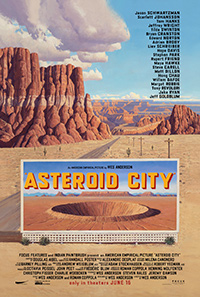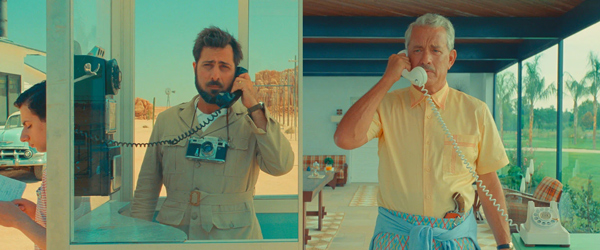The Lost City of Twee: Anderson Continues Quest of Counterfeit Sentiments
 Somewhere along the way, over the past twenty years, Wes Anderson’s style completely eclipsed his substance, and never has this been more apparent than the tiresomely shallow Asteroid City. Seemingly unable to produce a narrative not buoyed by an overstuffed assembly of celebrity, his latest deepens the sense of Russian Doll syndrome which pervaded 2021’s The French Dispatch, forgetting to imbue his customarily impressive production design with any discernible objective. A vast, empty spectacle of meandering, overly mannered happenings submerged in layers of fussy, intricate details quickly deflates beneath a hodgepodge of Anderson’s expected peripheral spasms for a film which feels unsalvageable in its shambolic intention.
Somewhere along the way, over the past twenty years, Wes Anderson’s style completely eclipsed his substance, and never has this been more apparent than the tiresomely shallow Asteroid City. Seemingly unable to produce a narrative not buoyed by an overstuffed assembly of celebrity, his latest deepens the sense of Russian Doll syndrome which pervaded 2021’s The French Dispatch, forgetting to imbue his customarily impressive production design with any discernible objective. A vast, empty spectacle of meandering, overly mannered happenings submerged in layers of fussy, intricate details quickly deflates beneath a hodgepodge of Anderson’s expected peripheral spasms for a film which feels unsalvageable in its shambolic intention.
A 1955 television show host (Bryan Cranston) announces their latest segment will showcase the staging of a play called Asteroid City by a genius playwright, Conrad Earp (Edward Norton), who the show returns to intermittently to showcase the origins of the play’s casting, including of the lead character, Augie Steenbeck (Jason Schwartman). Getting to the staged play, Augie is a war photographer who has just lost his wife (Margot Robbie) but hasn’t told their four children, including Woodrow aka ‘Brainiac’ (Jake Ryan) and preadolescent triplet girls. Their car breaks down right as they reach their final destination, where Woodrow is to present an invention alongside a handful of other brilliant children at an annual Junior Stargazing Convention. Dr. Hickenlooper (Tilda Swinton), a scientist, and General Grif Gibson (Jeffrey Wright), the host of the awards ceremony, are on hand to moderate. Augie’s grumpy father-in-law, Stanley Zak (Tom Hanks), arrives to pick up the triplets while the car is being repaired by the local mechanic (Matt Dillon). Also in attendance are a famous Hollywood actress, Midge Campbell (Scarlet Johansson), and her daughter, Dinah (Grace Edwards). Their event is interrupted by an alien being who takes the city’s namesake, an unassuming meteorite which left a large crater-cum-tourist attraction. In response, the federal government quarantines everyone at the convention until further notice.

The fifth Anderson narrative co-written by Roman Coppola, Asteroid City feels like a cry for creative help, as if some greater power needs to finally step in and administer some restraints, testing the director’s abilities to edit himself, maybe switch things up a bit by attempting to balance an appropriate number of characters for a chamber piece. This bloated morass feels like it’s zipping around at breakneck speed to distract the audience from realizing the film has nothing to say about anything in any regard. Like the sham Wizard of Oz begs, ‘pay no attention to that man behind the curtain.’ Certainly, no one depicted in Asteroid City is having any kind of authentic human experience, though Anderson’s regular motifs regarding death, illicit romance, and a group of people united by some sort of specific occupation or event are elements trotted out for the umpteenth time. It doesn’t help that his characters are all given the same kind of verbose, hyper-articulate speech patterns, which reduces them all to robots programmed to plunder a thesaurus. A gay kiss requiring a squint and another brief nude scene feel like lethargic attempts to suggest a struggle to appear daring.
Tedium sets in almost immediately, like rigor mortis in a corpse. Frames within frames collide, as Cranston’s television show host introduces the playwright of the production regarding a pretend city hosting an annual event interrupted by an extraterrestrial being. On paper, this sounds infinitely more interesting than what transpires. Tertiary players are injected (like a director played by Adrien Brody, a teacher played by Willem Dafoe), though they add little to livening whatever environment they’re a part of. Arbitrary tile cards announce acts and scenes, prolonging a sense of stagnation rather than energizing the film’s flaccid, eventually inert energy. Unexpected chuckles are scattered throughout, though the intended comedic effect of many of these moments fall horrendously flat. Schwartzman has a moment or two (though one would expect more since he commands the most screen time), and Scarlet Johansson, employing a Tallulah Bankhead growl, proves she’s an ace at conjuring the requisite energy of this period (as she did playing Janet Leigh in Hitchcock and the Ethel Merman prototype in Hail, Caesar!). One senses the cast trying to make this material crackle, but the shifting menagerie on Anderson’s Ark all seem to cancel each other out.
Even the somewhat startling appearance of an alien, played by Jeff Goldblum in what amounts to a cameo, feels tiresome, with Anderson recycling Slim Whitman on the soundtrack (the singer whose warbly crooning killed the attacking Martians in Tim Burton’s 1996 sci-fi parody, Mars Attacks!). The tinkling piano keys of Alexandre Desplat’s score, a demure Tilda Swinton, and stiff turns from Tom Hanks, Hong Chau and Margot Robbie suggest there were plenty of opportunities for someone, somewhere to suggest this needed to go back to the drawing board, as Asteroid City fails to generate any kind of interest, orbital or otherwise. Gadzooks, it’s godawful.
Reviewed on May 23rd at the 2023 Cannes Film Festival – Competition. 104 Mins.
★/☆☆☆☆☆


